Yeovil Celebrates the 1887 Jubilee
The 1887 Jubilee
How Yeovil celebrated Queen Victoria's Golden Jubilee
The Golden Jubilee of Queen Victoria was celebrated on 20 June 1887 on the occasion of the fiftieth anniversary of her accession on 20 June 1837. In London the occasion was celebrated with a banquet to which fifty European kings and princes were invited. In Yeovil the celebrations lasted all day - beginning with the firing of cannons at 6am!
|
From the
diary of
Louisa
Harris .... "5 June 1887: Nearly all the Sunday schools have assembled at the Town Hall in order to practice the singing of specially appointed hymns for the Queen's Jubilee. What an absorbing subject is this great event," "9 June 1887: The Misses Harris called this evening. The principal subject of conversation was the Jubilee. Very extensive preparations are now being made for its celebration. What a pity if after all it should fall short of expectation and all the dreams so fondly indulged in respecting it be chilled by disappointment." "12 June 1887: More Sunday school rehearsals - the final one, next Sunday, to be in the open air - the Town Hall not being large enough for them all." "20 June 1887: On Saturday afternoon Emmie, Bessie and Maud [Louisa's sisters] drove over to Bradford [Abbas] in order to be present at a dinner given by Uncle Whittle for the people employed on his farm in honour of the Jubilee. They did not get home until 12pm. Tomorrow is the great day of the year." "24 June 1887: The long-looked for Jubilee day is at last over and nothing now remains for me to briefly describe the manner in which it was here celebrated and the way in which we spent it. The weather was brilliant, the extreme heat, however, being tempered by a light breeze. The morn was ushered in by merry peals from the bells of St John's which were repeated at intervals during the day. Cannon were fired and Royal Salutes given. The Volunteers presented arms in the Borough and before dismissal gave hearty cheers for the Queen. From a very early hour the streets were filled with people inspecting the decorations. These were exceedingly good. Almost every house in the town bore some outward visible sign of the feeling of loyalty that so universally prevailed and many of them were decorated in a manner which displayed much artistic merit. Among the latter we may mention the various public buildings. Of these the Town Hall was the most profusely embellished, nearly the whole of its exterior proportions being hidden by dense masses of foliage, floral groupings, mottoes, national devices, etc. At night most of the houses were illuminated, gas jets and coloured lamps making a brilliant show. As we happen to live in a back street we were content with simply hanging a few flags from our windows. The abode of our neighbour, Mr Edgar, however, was decked far more elaborately. Two really good artificial stone bridges formed very striking features in the decorations of the town, one of these was created at the bottom of Hendford Hill, the other near the entrance to the Fete Field (see Gallery). At 10am divine service was held in the various places of worship. About 12am there was a gorgeous procession headed by two Marshals; following these were representatives of agriculture and the various local trades; the Friendly Societies, Fire Brigade, Mayor and Corporation, Mace Bearer and other officers; besides all these were many private individuals, the whole being accompanied by three bands [Yeovil Town Band, Yeovil Military Band and Bradford Abbas Band]. On arrival in High Street the procession was joined by a numerous gathering of Sunday school children who had previously met and sung the National Anthem and special hymns. The entire company now proceeded to the Fete Field, Wyndham, where at 2pm dinner was served with the usual formula. Those who were happily possessed of admission tickets alone being permitted to partake of the spread [estimated by the press at 3,000]. An amusing object in the procession was one Lizzie Little [see Gallery], an aged seller of coke who very oddly attired represented her honourable profession by riding in a new cart drawn by a new donkey with several bags of the useful commodity she vends at the bottom of the vehicle. The donkey and cart were Jubilee gifts and on the following day were formally presented to the old lady who went through her part with an air of the utmost dignity and importance. The pageant was witnessed by myself and some friends from Mrs Edgar's windows as they afforded a better view than our own. Ma and I did not go to the field till shortly after four, arriving there just as the Sunday school and other children were seated at the ample tea that had been provided for them. I was much struck by the scenes which met my gaze on entering and though years should pass over my head, I do not think its memory will ever fade from my mind. The picturesque array of tents for dancing, refreshments, etc., the swinging boats, shooting galleries and roundabouts with all the other paraphernalia of fete occasions; the moving masses of humanity amongst whom every variety of colour prevailed altogether forming a spectacle of the utmost gaiety and excitement. Till late in the evening old English sports and games of all descriptions were freely indulged in amidst strains of music and the repeated sounds of fog signals from the adjacent railway. At half past 9pm the field was temporarily almost deserted as most of the people had left in order to witness the assembling of the party of masqueraders who were to kindle the Beacon Fire on Summer House Hill. [Louisa then returned home to watch the beacon from her bedroom window while her sisters went to Summerhouse Hill] They [her sisters] did not, however, get a better view of the Beacon Fire than I, as my window happens to command a splendid prospect of the hill on which it blazed. A more glorious sight I never beheld, neither one that has left a more lasting impression upon my mind. I think it, here, the crowning incident in the events of the day. I watched till a late hour, being reminded of the Spanish Armada. It burnt brilliantly. My room was completely lit up by the flame. After kindling it the masqueraders repaired to the fete field, where proceedings were brought to a close by a grand display of fireworks. Thus ended the long anticipated Jubilee-day which for months had been the centre of public interest and general topic of conversation."
|
gallery
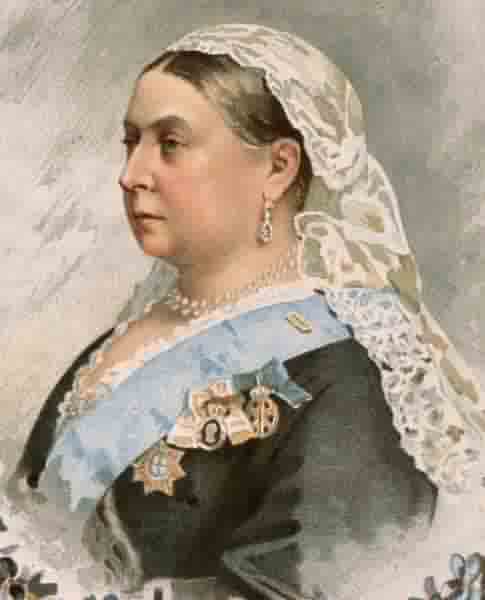
Queen Victoria painted at the time of her Golden Jubilee in 1887.
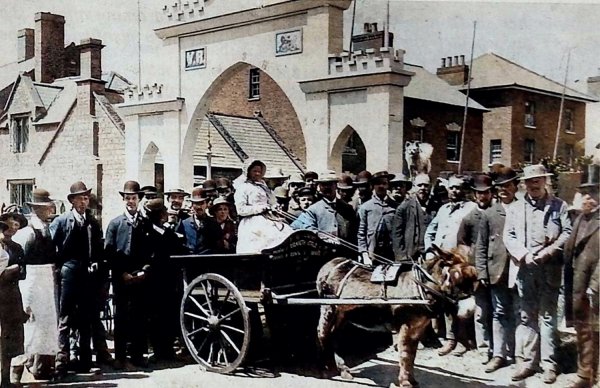
A colourised photograph of the elderly lady, Lizzie Little - a coke seller (the fuel, not drugs) - with her new donkey and cart, presented to her as part of Queen Victoria's Jubilee celebrations, in front of one of the two artificial stone bridges built for the 1887 Golden Jubilee celebrations - this one being across Newton Road - Pen Style Toll House is seen behind the arch at left.

Oops! From the 23 September 1887 edition of the Western Gazette.
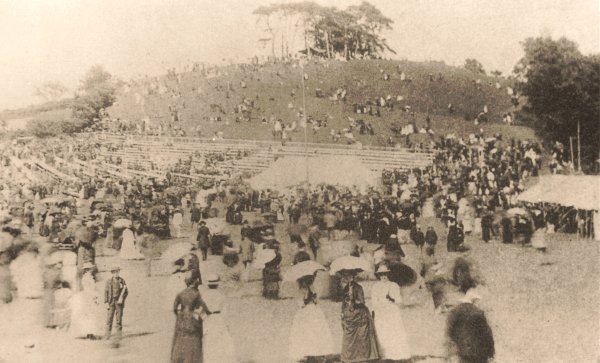
Crowds gather at Wyndham Hill in 1887 to celebrate the Golden Jubilee of Queen Victoria. At this time it was known as Victoria Hill and the lower slopes known as the Fete Field. At centre are seen the tables and seating that accommodated some 3,000 ticket holders for the dinner and, later, Sunday school children for a free tea. Notice that at this time there were more than just the four lime trees on the summit. At this time the trees were exactly 25 years old.
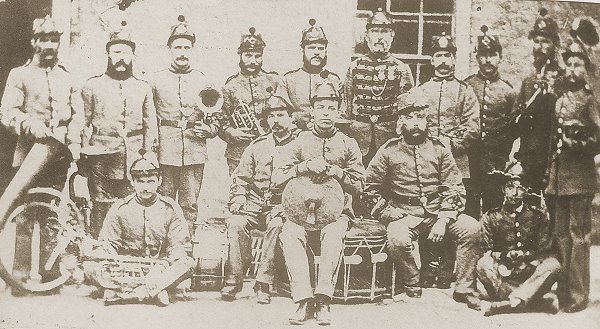
Bandmaster Alfred Bear with the Yeovil Military Band - the band of Yeovil F Company, 2nd Battalion, Prince Albert's Somerset Light Infantry, photographed around 1880.
Standing, left
to right, Alfred
Dunn, Ebenezer
Giles, Harry
Pomeroy, Walter
Bond, Herbert
Jenner, Alfred
Beare, William
Fort, Jack Fort,
Charles Lane, EJ
Lucas.
Seated;
George Larcombe,
Walter Creese,
Albert Ostler,
Herbert Slade,
unknown.
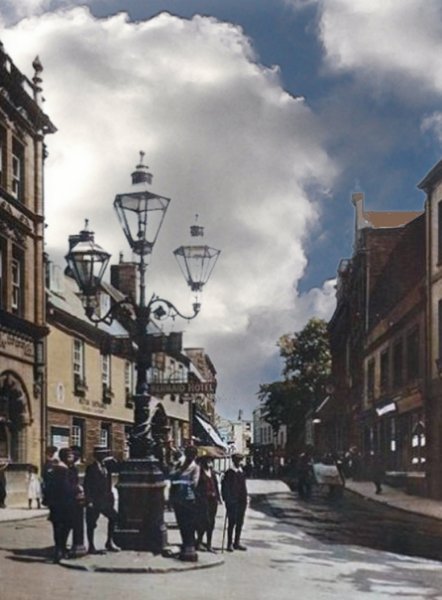
From my
collection.
This
colourised
image
features in my
book 'Yeovil
- The Postcard
Collection'.
This colourised photograph of around 1910, shows the three-lamp 'Sugg Lamp' in High Street that was donated to the town in 1887 by the Gas and Coke Company to mark the Golden Jubilee of Queen Victoria. The lamp was removed in 1928.
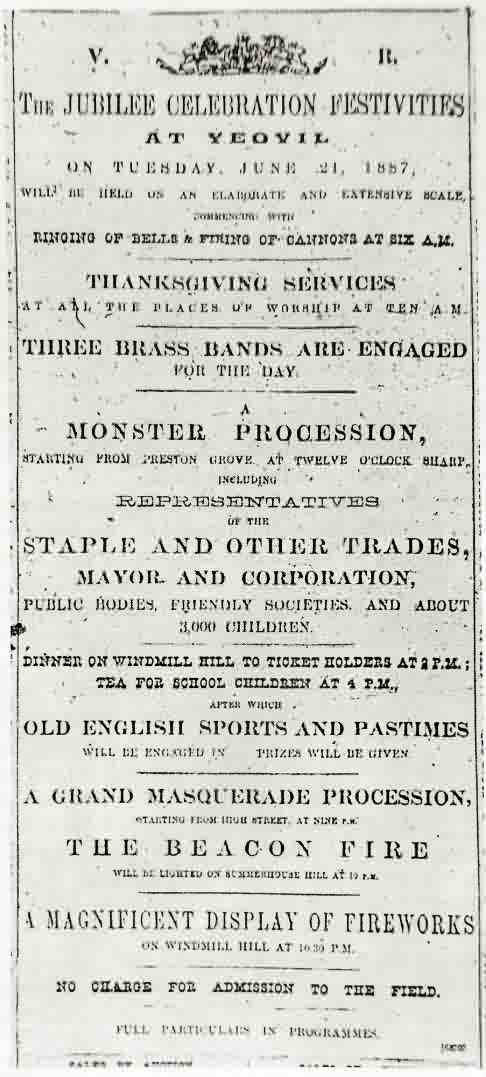
The activities planned for the Jubilee Day celebrations as published in the 17 June 1887 edition of the Western Gazette.